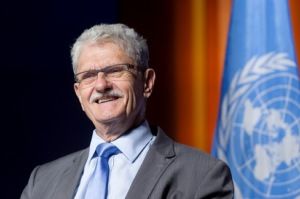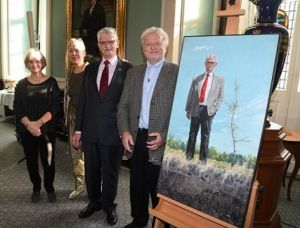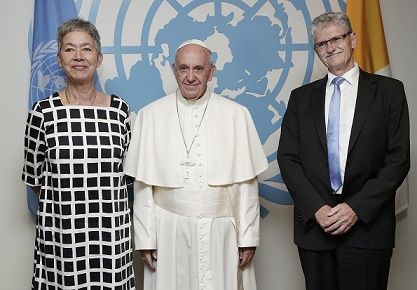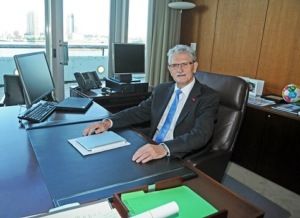News
Mogens Lykketoft: caring for people as well as politics
This article is more than 7 years old.
Mogens Lykketoft has had a long and distinguished political career, with a number of ministerial posts and he was also the first Dane to become President of the UN General Assembly

Lykketoft in New York in the role of President of the UN General Assembly (photo: UN/Mark Garten)
Since his student days, Mogens Lykketoft has been involved with Socialdemokratiet (the Social Democrats).
He is currently an MP and has held ministerial posts for tax, finance and foreign affairs.
From October 2011 until July 2015 Lykketoft was chosen as Speaker in the Danish parliament, Folketinget, and in June 2015, he was elected President of the UN General Assembly.
Mogens Lykketoft spoke to the CPH POST:
You have had a long and distinguished career in Danish politics. What would you consider the high points?
When you’ve been in the Danish parliament as long as I have, there are both ups and downs. I’ve been privileged to hold important positions, especially the 8 years I served as minister for finance. We made an impact by changing this country from being one of very very high unemployment to a very low one. We had a surplus both on the current account and the budget. That had not happened for decades. That’s where I think I made the most important changes for the most people.
Being foreign minister also offered very fascinating possibilities. I was only in the post for one year, but I learned that the difference between being finance minister and foreign minister in a small country like Denmark is that when you’re finance minister, you have a great deal of influence in a very small country and when you are foreign minister, you have very little influence in the whole world!
Later, you were the party’s spokesperson on foreign affairs. Have you always been interested in this field?
I was in politics for Socialdemokratiet as a student leader in the 60s and international issues were what I was mostly engaged in. We had the Vietnam War, the Soviet re-occupation of Czechoslovakia, the fascist coup in Greece. So it was almost a return to my youthful interests when I was offered the post of foreign minister and after that, as party leader. Later, I was the party’s foreign policy spokesperson until I was elected Speaker of Parliament.
It was also with that in mind that the foreign office subsequently approached me and asked whether I’d be interested in being put forward as candidate for President of the UN General Assembly.

Lykketoft unveils his official portrait. L-R: Pia Kjærsgaard, Mette Holm, ML, and artist Roald Als (photo: Hasse Ferrold)
You were foreign minister for almost a year from 2000 to 2001. Could you see a sharp divide pre- and post-11 September 2001?
Certainly! That was a very important and dark event that changed the priorities of foreign policy and the whole situation. What we went on to experience was that the way the world reacted under American leadership was in many ways misguided and has not been successful.
Afghanistan has now been at war for 4 decades with no clear outcome and lots of human suffering. Iraq has been torn by deep ethnic and religious conflicts since the US occupation, which was a consequence of September 11 but had nothing to do with it. Saddam Hussein was in no way involved in that act of international terrorism. He didn’t possess weapons of mass destruction.
I was one of those who argued against Danish participation in the invasion of Iraq because, as I said when we took the decision, we are in danger of opening up for deep conflicts that we don’t know about. That was exactly what happened.
Under Anders Fogh Rasmussen’s government, Denmark’s foreign policy took a radical shift towards a more interventionist role in international conflicts. If you had been in office then, do you think you would have gone down the same road?
If I could have decided, we would have participated in Afghanistan but I very much doubt that I would have promoted the idea of us being in the second round in Afghanistan in Helmand Province. There has been so little success and so much loss of human life.
What we learned – and we didn’t really learn it from the outset – was that while we were in Helmand we were in a province that had probably never been under the control of central government. What we’ve seen afterwards is that when the British and Danish forces withdrew, the Taliban advanced again. This is a tragic example of how difficult it is to manage the conflict in Afghanistan.
I do think, though, that our presence from the outset was extremely justified because the people who planned the attack on September 11 were there and they were being protected. However, the whole operation has not been a success.
I do know for sure that if it had been down to me, we would never have participated in the Bush invasion of Iraq – either morally or militarily.
We’ve not really learnt much because we’ve made a mess of things in Libya as well …
Maybe all of us got Libya wrong, but in hindsight it is obvious that we took a decision with very little knowledge of what the consequences would be and no willingness to stay on when the decision to bomb and destabilise that country had been taken.
What we did was only to destroy the old regime and not to stabilise the country. We can all see now that this has had enormous and unmanageable consequences for Europe. Libya is a gateway for refugees and migrants and there are a lot of conflicting warlords vying for power.
Do you think that there is a way we can leave Afghanistan with honour and the country stable enough to govern itself?
It’s hard to say. It will take a lot more effort from the Afghan Government to fight corruption and gain acceptance. The basic problem is systematic corruption that is so widespread that whatever resources we put in disappear.
What do you regard as your greatest achievement in the foreign policy arena?
In my short time as foreign minister before September 11, I was most involved in the discussions surrounding Israel and Palestine. I was also an advocate for better European co-operation.
Because of the Intifada, Sharon’s invasion, and the breakdown of the Camp David talks – and with them, the hope for a final agreement – Palestine was very high on the radar. I’ve always supported the existence and security of the State of Israel. However, I’ve also supported what the UN has decided numerous times – the establishment of a viable and sovereign Palestinian State and a fair division of that territory, with Jerusalem as capital of both states.
What we’ve seen over the years is a lessening possibility for a Palestinian State and the continuing occupation. I always ask the question: “What would the inside of your head be like if you’d been under foreign occupation between 50 and 70 years?” This is underlined by the inability of the international community to insist on what has been decided many times.
With the Americans giving one-sided support to Netanyahu’s Government, the continued illegal settlements and the incorporation of Arab Jerusalem into the State of Israel, we have no perspective for a peaceful solution. What troubles me a lot is that we have what we’ve come to consider as a Western Democracy behaving more like an occupying power.
How do you view developments with regard to Russia? Are we heading towards another ‘cold war’ or is this just fear-mongering and overstatement by the press?
That is really hard to predict. What we must hope for is that at some point in the not-too-distant-future, the West and Russia will come to co-operate better so that we can avoid this vicious circle of armaments races – both nuclear and conventional. We have to defuse the conflicts – both in Ukraine and in Syria. It is extremely difficult with the attitude of President Putin and his way of understanding the world. He seems to be a ‘zero sum’ politician – I can only win if you lose. Unfortunately. Trump seems to have a similar world view.
Everything we’ve done after WWII has been designed to promote the idea that politics should be a ‘win-win’ situation. What has happened is that this very dangerous ‘zero-sum’ understanding of international politics has re-emerged under Putin and Trump and historically, this has created wars.
What do you see as the greatest challenges facing Denmark on the world stage at the moment?
It is a great challenge for Denmark to find its feet as an active partner in a stronger, rejuvenated European co-operation. For a number of reasons in the past we’ve had problems finding our feet. It is also very obvious that we can’t identify ourselves with the present American administration. Our British friends, with whom we’ve been very connected in international affairs, are moving away from Europe.
It is also a problem to formulate the right answers on the problem of refugees and migrants in the modern world. We have to understand that the people on the move is a wave that can only be met with a much greater effort in the development of Africa and by taking care of displaced persons and refugees in conflict zones.
We must remember that one of the main reasons for people moving to Europe in a haphazard way is that the supply of money for the UN’s refugee work is insufficient and the UN has had to cut down operations by 40 percent in 2015. We also have to understand that at least politically, Europe is unable to receive many millions of people – that also applies to the most open countries like Germany and Sweden nowadays.
On top of that, we have to understand that we need to make much greater efforts to help displaced persons in or near conflict zones. It is not only a little, but a major undertaking. It is also a matter of self-interest …
You hear a lot about helping refugees locally, but at the same time we seem to be cutting aid funding and that doesn’t seem to make sense …
This is a very important point. When I was President of the UN General Assembly and Ban Ki-moon was Secretary General, we presented a UN report in Dubai on humanitarian finance. The report said that with 65 million displaced persons and 25 million of them refugees, mostly in the neighbouring countries, we need between 15 and 20 billion dollars extra to handle this – that’s the gap. Is that a lot? Well, if every country in the world paid 25 cents out of every 1,000 dollars earned this would be solved! It is a lot, but would be in everybody’s best interest to close that gap.
How did you become President of the UN General Assembly?
The Danish foreign office came to me about two and a half years before I was elected and asked whether I was interested in being the Danish candidate. Denmark had never held the post before and it was thought that I had a good chance. I asked what I would actually be doing and they said that it was not only an honorary post; it had some political clout. This was partly as a result of the impatience from the UN membership with the Security Council, which had not been performing well in stabilising or stopping conflicts worldwide. There was an interest in strengthening the role of the General Assembly and it was felt that Denmark could help to do it. We had a lot of support from the Nordics, France and Germany.
A lot of people in Denmark painted a picture of me as being anti-American because of my views on the conflict in Iraq and the Palestine issue. For them it was perhaps a surprise that the Obama administration and US Secretary of State John Kerry supported my candidacy. My criticism of US policy over the years very much coincided with that levelled by Obama himself!
With those major players in support, we got no opposition and so we could prepare well in advance and increase our influence. I also got the strongest cabinet ever up to that time because large and small states supported my efforts.
What I was able to influence through the presidency was the process of electing the new Secretary General. In the UN, I quickly came to understand that all politics is process and all process is politics. If you change the process, you may be able to change the political outcome.
Previously, the secretary general had been picked at a very late hour when some of the major players met and it would preferably be a candidate that would not disturb any of them. With the support of the general membership we managed to get the Security Council to accept a new procedure where no candidate would be considered by the council before having been presented at a public hearing in the General Assembly.
We also organised a discussion between the candidates on Al-Jazeera – like a Danish election – which was transmitted to 200 million people worldwide. This allowed the most qualified candidate to come to the fore. The major powers would be unable to block the appointment. We got the best person elected. Of course we don’t know if Antonio Guterres would have been elected under the old procedures, but I’m sure we underpinned the idea of the best and most competent candidate being chosen.
Will this be standard procedure in future?
Yes! It will be impossible to put that particular genie back in the bottle again …
What do you remember most fondly from your time in New York?
There were many fascinating events, but I do remember a very short and intense meeting with President Obama where we discussed caring for refugees.
I also remember meeting the Pope. Pope Francis addressed the General Assembly and I met him personally beforehand. I got a very powerful impression of this very new and very different character at the helm of the Catholic Church as a strong supporter of all we were setting out to do on climate and sustainability. He came across as a very strong personality who also gave a wonderful speech. What he tries to do is marvellous.

Mogens Lykketoft and his wife Mette Holm meet Pope Francis during the pontiff’s visit to the UN headquarters (photo: UN/Evan Schneider)
If you were given the choice of another ministerial post, which one would you choose?
It would have been fascinating to try to be prime minister also – I fought unsuccessfully for that against Anders Fogh Rasmussen in the 2005-elections. I have been very happy for what I have been able to do since then instead.
I was more disappointed that he [Anders Fogh Rasmussen] continued than the fact that I did not get the post myself.











































